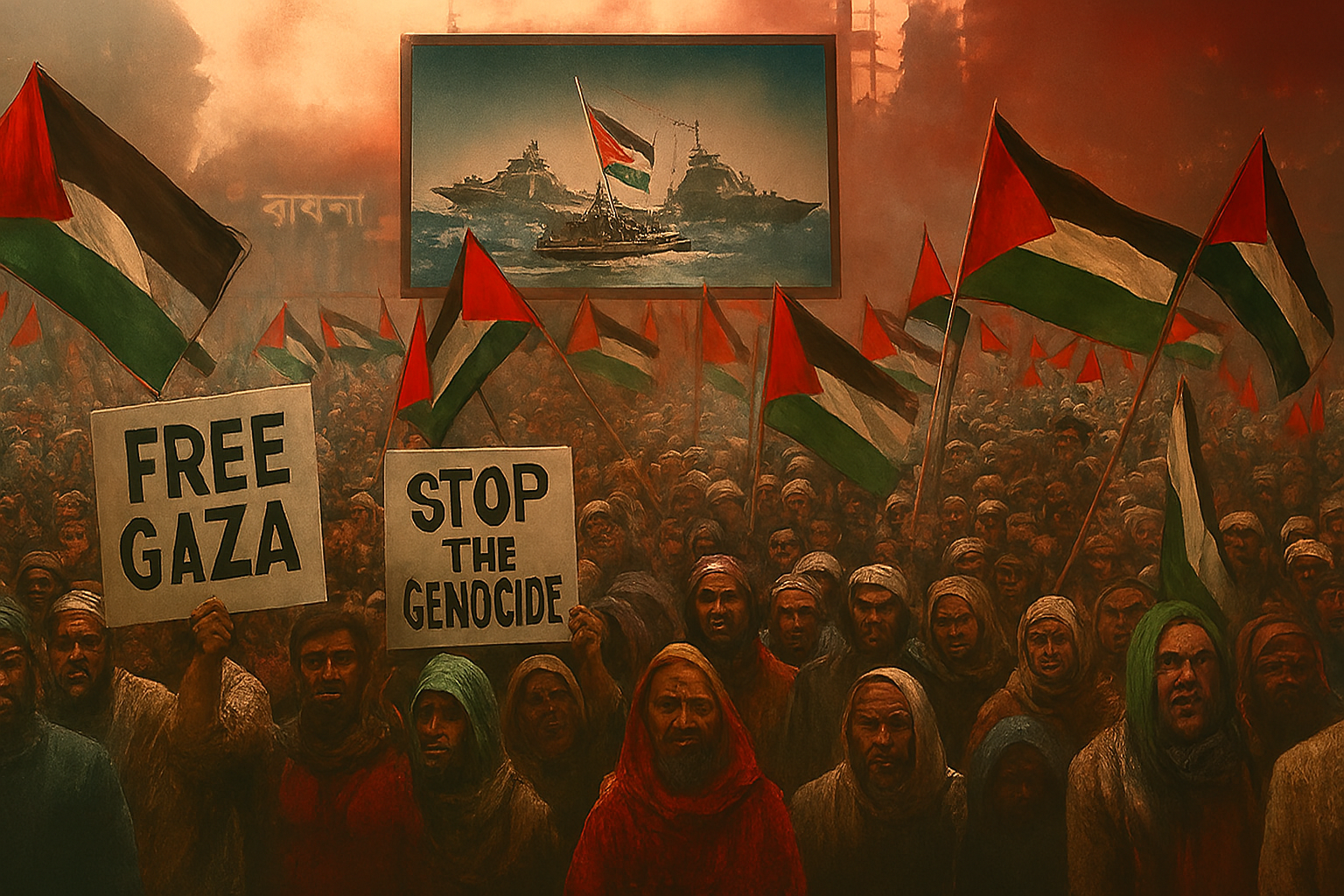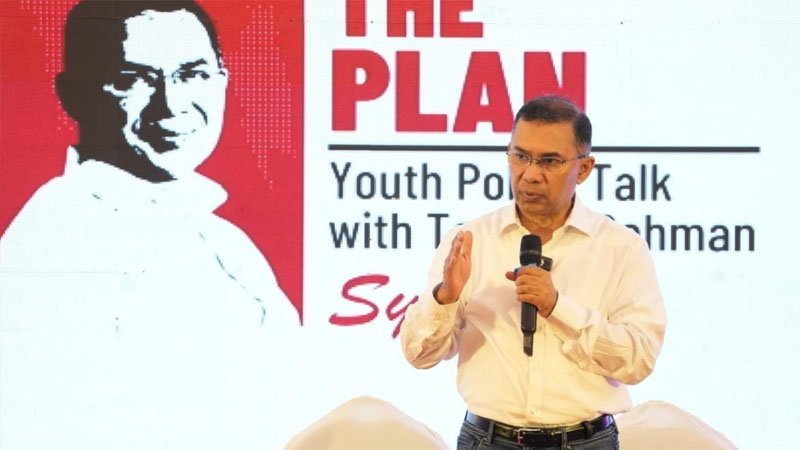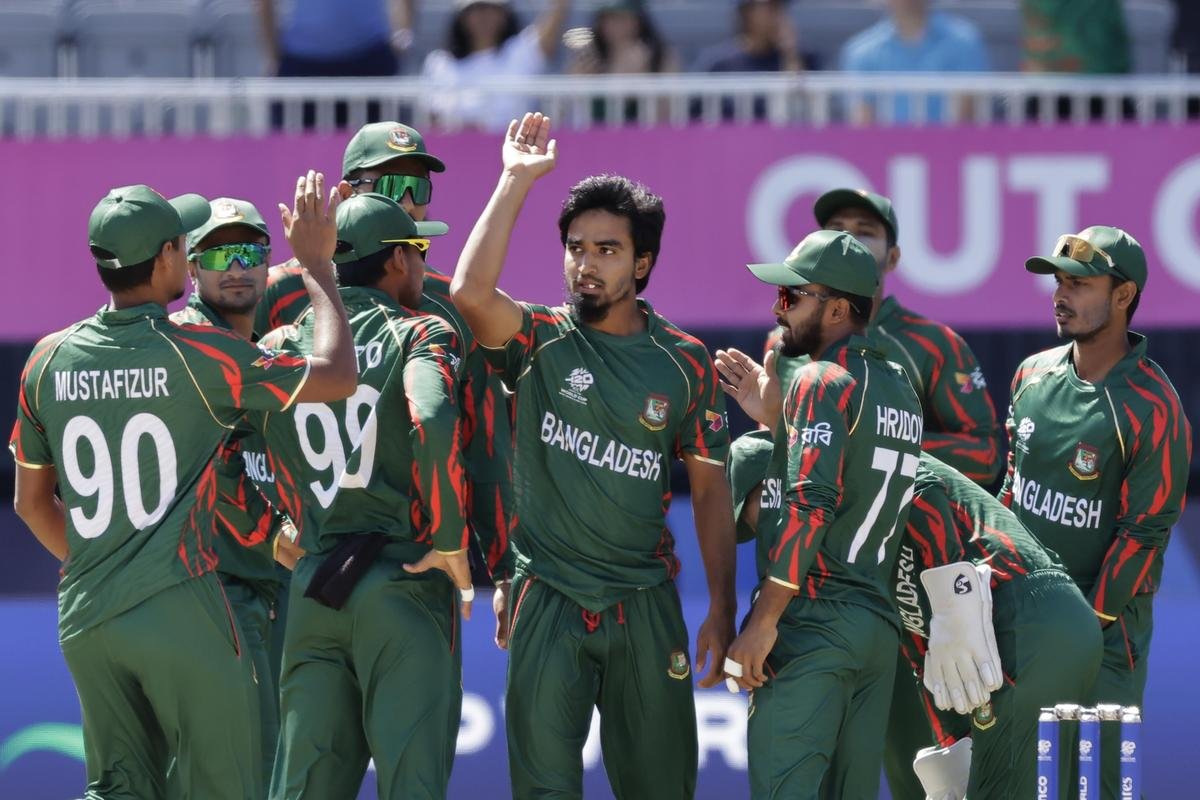Israeli Assault on Gaza Aid Flotilla Triggers Mass Protests in Bangladesh

Bangladesh Erupts in Protest After Israeli intercepts GSF
The recent interception on the Global Sumud Flotilla, which was carrying humanitarian aid to Gaza, by Israeli naval forces has ignited widespread protest across Bangladesh, demonstrating deep solidarity with Palestinians and strong condemnation of the aggressive interception. As the world stages outrage at Israel’s seizure of the aid vessels, Bangladeshis have taken to streets in Dhaka and other cities to demand justice and humanitarian access to Gaza.
The Global Sumud Flotilla
The Global Sumud Flotilla is a large-scale humanitarian convoy consisting of more than 50 vessels and participants from over 45 countries, including Bangladesh’s Shahidul Alam and Bangladeshi-origin activist Ruhi Loren Akhtar. Its mission was to deliver urgent humanitarian supplies—including food, water, medical aid, and baby products—to Gaza, where millions of Palestinians are facing shortages under blockade.
“Sumud,” an Arabic word meaning “steadfastness,” reflects the spirit of resilience among Palestinians and the international solidarity movement supporting them. The flotilla is not just about aid delivery but also about raising awareness, breaking the silence, and challenging restrictions that prevent life-saving materials from reaching civilians.
What Happened at Sea?
The flotilla, organized under the banner of the Global Sumud Flotilla, aimed to break Israel’s maritime blockade of Gaza by delivering humanitarian aid and raising global awareness. According to recent reports, Israeli naval forces intercepted nearly all 40 vessels, detaining over 450 activists in international waters. Among the detainees were prominent international figures, journalists, parliamentarians, and renowned activists.
One vessel, the Marinette, was intercepted some 42.5 nautical miles from Gaza and led to Israel’s port at Ashdod. Israel claimed the operation was a lawful enforcement of its naval blockade and offered to transport aid independently. However, critics argue that the interception violated international maritime law and further worsened Gaza’s humanitarian crisis.
Public Reaction in Bangladesh
In Bangladesh, the attack on the GSF was met with swift and forceful condemnation. Protestors across Dhaka, Chittagong, Sylhet, and other cities rallied behind banners reading “Free Gaza,” “Stop the Siege,” and “Hands Off Humanitarian Aid.” A New Age report noted that Friday saw large demonstrations in the capital and elsewhere, with people demanding that the government take diplomatic action.
The #MarchForGaza movement has already gained traction in Bangladesh earlier in 2025, when over 100,000 people gathered in Dhaka’s Suhrawardy Udyan to express solidarity with Palestinians. That rally had made clear how strongly the Bangladeshi public feels about Gaza. The latest flotilla assault has catalyzed further outrage and mobilization.
Political parties across ideological lines voiced support for the protesters. Civil society groups, student organizations, and human rights activists also joined in, calling for the Bangladesh government to lodge strong diplomatic protests with Israel and international bodies.
Legal and Humanitarian Stakes
The interception of the Gaza aid flotilla raises serious legal questions. The raid occurred in international waters, raising doubts about the legality of Israel’s seizure under maritime law. While Israel defends its actions as necessary under a security doctrine, many legal scholars assert that humanitarian missions should receive protection under international conventions when civilians are suffering.
Gaza has been subject to a strict land and sea blockade for years, complicating the delivery of essential food, medicine, and fuel. The flotilla was intended as both a delivery mission and a symbolic challenge against that blockade. The interception thus not only stymied aid but also sent a harsh message about who controls access to Gaza.
Israel’s decision to deport detainees, including foreign parliamentarians, triggered global backlash and diplomatic protests. Some governments have demanded legal investigations, sanctions, and the immediate release of activists.
Bangladesh’s Foreign Policy & Position
Bangladesh has long supported the Palestinian cause and does not recognize Israel. The flotilla incident offers Bangladesh a renewed platform to assert its stance on global rights and humanitarian law. Officials are expected to recall the Bangladesh ambassador in Israel (if any), lodge protests via the UN, and potentially call for action through OIC and other forums.
With public sentiment strongly pro-Palestine, the government faces pressure to move beyond rhetoric. Protesters are demanding clear action—like diplomatic boycotts, sanctions, or support for international legal proceedings.
Regional and Global Repercussions
The Gaza aid flotilla incident has reverberated worldwide. Protests erupted from Italy to Brazil. In Europe, general strikes, large demonstrations, and diplomatic expulsions followed the flotilla interception. South Africa condemned the move and demanded the release of detained activists, including Mandela’s grandson. These developments amplify pressure on Israel from multiple fronts.
Additionally, Israel’s actions may draw further legal scrutiny, especially under the International Court of Justice (ICJ) cases concerning alleged war crimes and genocide in Gaza.
Challenges & Possible Paths Forward
Bangladesh’s ability to influence outcomes is limited. Direct intervention is unlikely. But Bangladesh can:
-
File diplomatic protests, recall envoys, and engage through multilateral platforms
-
Raise the flotilla issue on international stages such as the UN General Assembly, Human Rights Council, and OIC
-
Support legal accountability by backing investigations or prosecutions in international forums
-
Mobilize civil society, NGOs, and media to keep pressure alive
Domestic stability is also a concern. Protests must remain peaceful and well managed. The government will have to balance expressions of national solidarity with diplomatic caution.
Solidarity That Speaks Volumes
From Dhaka to Chittagong, Bangladeshis marched in solidarity. In streets, mosques, student halls, and online, public outcry resonated. The Gaza aid flotilla attack validated long-standing anguish over Palestinian suffering in Bangladesh’s collective conscience.
Even when state power is limited, the moral force of public protest can influence narratives, draw attention, and signal political will.







